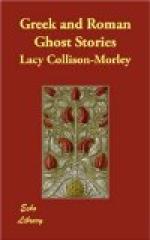Lucan[64] describes how Sextus Pompeius went to consult Erichtho, one of the famous Thessalian witches, as to the prospects of his father’s success against Caesar, during the campaign that ended in the disastrous defeat at Pharsalia. It is decided that a dead man must be called back to life, and Erichtho goes out to where a recent skirmish has taken place, and chooses the body of a man whose throat had been cut, which was lying there unburied. She drags it back to her cave, and fills its breast with warm blood. She has chosen a man recently dead, because his words are more likely to be clear and distinct, which might not be the case with one long accustomed to the world below. She then washes it, uses various magic herbs and potions, and prays to the gods of the lower world. At last she sees the shade of the man, whose lifeless body lies stretched before her, standing close by and gazing upon the limbs it had left and the hated bonds of its former prison. Furious at the delay and the slow working of her spells, she seizes a live serpent and lashes the corpse with it. Even the last boon of death, the power of dying, is denied the poor wretch. Slowly the life returns to the body, and Erichtho promises that if the man speaks the truth she will bury him so effectually that no spells will ever be able to call him back to life again. He is weak and faint, like a dying man, but finally tells her all she wishes to know, and dies once again. She fulfills her promise and burns the body, using every kind of magic spell to make it impossible for anyone to trouble the shade again. Indeed, it seems to have been unusual to summon a shade from the lower world more than once, except in the case of very famous persons. This kind of magic was nearly always carried on at night. Statius[65] has also given us a long and characteristically elaborate account of the calling up of the shade of Laius by Eteocles and Tiresias.




